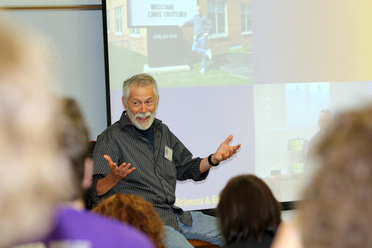Dr. Teri Lesesne of Sam Houston State University & Author Chris Crutcher Open Day One
"I hear voices a lot. They tell me to talk about books everywhere I go."

Dr. Teri Lesesne, the whimsically pink and blue-haired "Goddess of YA Literature," delivered the opening keynote. Lesesne's address focused on the marriage of YAL and common core curriculum and the importance of building a reader's community in the classroom. She shared her own love of reading and passion for teaching others to appreciate the written word ("I hear voices a lot. They tell me to talk about books everywhere I go," she confessed.) and also offered tactics and other best practices that she has found to be successful from her own classroom experiences.
"It's impossible to establish community in the classroom without the teacher being a reader themselves," she shared. "And their students must have access to books."
Dr. Lesesne also dismissed test standards as a valid gauge on how literature affects students.
"Testing can't tell you how much that book meant to that child," she cautioned her listeners.
She also sited several studies demonstrating that students comprehended what they read better when their teachers are avid and enthusiastic readers as well and that 20 minutes of reading daily drastically improved students' reading scores.
Dr. Lesesne is past president and current executive director of the Assembly on Literature for Adolescents of the NCTE (ALAN) and professor of library science at Sam Houston State University. She is the author of Making the Match: The Right Book for the Right Reader at the Right Time, 4-12, Reading Ladders: Leading Students from Where they are to Where We’d Like Them to Be, and Naked Reading: Uncovering What Tweens Need to Be Lifelong Readers that help teachers and librarians choose books for adolescents.
For more on Teri Lesesne's research and experiences at the Conference, follow her on Twitter @ProfessorNana. http://professornana.livejournal.com/
http://www.shsu.edu/lis_tsl/
"If your education doesn't make your life better, what good is it?"

As a child therapist and former teacher, Crutcher spoke about the need for honesty in writing, no matter how brutal, and shared his own experiences with a common consequence of such writing: censorship.
"One of the good things about being censored is they have to read you to censor you," he joked. "But if you're going to tell a story, tell it in its native language."
He also regaled attendees with anecdotes from his own life and shared the real people and circumstances that inspired some of his most beloved characters. A pin drop could be heard as he read an excerpt from his novel, Deadline, which like the majority of his work, deals with adolescents coping with grief and loss.
"If you want to make a life important, shorten it," he shared of the book's hero, a teen fighting Leukemia.
"You grieve until you are finished," he concluded. "And don't let anyone tell you its time to move on or hurry.
Despite his penchant for ending up on school boards' banned lists, Crutcher insists that his writings and the stories they tell are vital to youth education, and can often be life-saving.
"If your education doesn't make your life better, what good is it?" he demanded.
Crutcher is an award winning novelist of teen fiction. His novels focus on teen athletes, including his most recent
Period 8, published in 2013. Five of Crutcher’s books appeared on an American Library Association list of the 100 Best Books for Teens of the Twentieth Century (1999 to 2000). A child psychologist by trade, Crutcher writes about children in
crisis. His work gives a voice to the thousands of unheard children struggling with issues far greater than those of the characters in his books. In an age of preoccupation with decreasing the stigma of mental illness, Crutcher’s work
brings an empathetic, human aspect to a prevalent societal issue.
For more on Chris Crutcher's work and experiences at the Conference, follow him on Twitter @ChrisCrutcher.
http://www.chriscrutcher.com/

 RSS Feed
RSS Feed